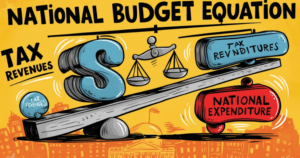Section 83(A) on the late payment penalty is missing in the Tax Procedure Act (2015) which was revised in 2018. However, section 83(A) was proposed to be inserted in the Finance Bill (2018) and was approved in Finance Act (2018).
The question is: should section 83(A) be in the 2018 revised Tax Procedures Act (2015)?
The answer is a resounding YES.
This is because all taxation proposals that were contained in the Finance Bill (2018) and were passed and approved by the Kenya Parliament and assented to by the Kenyan President became law.
The approved taxation proposals were published as Finance Act (2018) and were expected to be incorporated in the various specified tax laws.
Kenya Parliament is the body that makes laws including tax laws in this country. The Executive and all its Ministries including the National Treasury are responsible for implementing the laws.
However, though the Finance Bill (2018) proposed insertion of section 83(A) and the Kenya Parliament approved the insertion of the section (with changes), those charged with the responsibility of updating the Tax Procedures Act (2015) have for reasons better known to them decided to leave section 83(A) out of the 2018 revised Tax Procedures Act (2015).
But first things first. What was the proposal in the Finance Bill (2018) and what did the Kenyan Parliament decide according to Finance Act (2018)?
Finance Bill (2018)
Proposal Number 45 in the Finance Bill (2018) under Kenya Gazette Supplement No. 76 (National Assembly Bills No. 20) published in Nairobi, 19th June September 2018 recommended insertion of section 83A into No. 20 of 2015 by declaring that – The Tax Procedures Act (2015) is amended by inserting the following new section immediately after section 83(A) as follows,
Late payment Penalty – 83A. A person who fails to pay tax on the due date shall be liable to pay a late penalty of TWENTY per cent (20%) of the tax due and payable.
This proposal among others was presented to parliament during the 2018 budget day.
Finance Act (2018)
Number 45 in the Kenya Gazette Supplement No. 121 (Act No. 10) published in Nairobi on 21st September 2018 approved inserting the following new section immediately after section 83 as follows,
Late payment Penalty – 83A. A person who fails to pay tax on the due date shall be liable to pay a late penalty of FIVE per cent (5%) of the tax due and payable.
It is clear that in the two public documents; Finance Bill (2018) and Finance Act (2018), section 83A was extensively addressed. In Finance Act (2018), section 83A, the proposed introduction of late payment penalty which was not being levied in such taxes as VAT was not approved.
However, instead of Parliament which is the law-making body in Kenya approving the recommended late payment rate at 20%, the rate was reduced to 5%.
The Finance Act (2018) was assented to by Kenya President and it thus became law. Hence, the legal late payment penalty in Kenya is at the rate of 5%, not 20% which is being levied currently.
Implication of failure to insert section 83A in Tax Procedures Act (2015)
There are many implications of failure to insert section 83A in the revised Tax Procedures Act (2015). However, the following two are important.
First, it is a criminal offence to break any Kenyan law including tax laws (many taxpayers have been penalized and suffered for it).
Equally, levying any tax rates apart from those prescribed by Parliament is also a criminal offence. We have often been told that there is no one in Kenya above the law.
Any tax changes that have been approved by Parliament cannot be amended by anyone else. It is only Parliament that has powers to undo what it has approved.
Failure to insert section 83(A) in the 2018 revised Tax Procedures Act (2015) which may have resulted in exclusion of the section in the implementation of the tax laws in the country indicates wrestling of law-making responsibilities from Parliament to a “body” not recognized by the Kenya Constitution.
The other alternative is to go to the Courts and have the matter suspended. None of which has happened.
This “body” is in direct competition with Parliament and is engaged in some sort of a civilian coup – civil disobedience.
Second, failure to insert section 83A in the Tax Procedures Act (2015) may have resulted in some taxpayers paying excess late payment penalties and interest. There are two reasons for this:
- The taxpayers may be paying late payment penalty at the higher rate of 20% instead of 5%.
- Late payment interest is levied on the principal tax amounts plus any penalties.
The following example will clarify this situation better.
Example:
XYZ did not remit VAT kshs 5,000,000 for November 2018 by the 20th December 2018. The VAT was remitted on 21st December 2018. The question is …. in addition to the principal VAT amounts, how much in penalties and interest should XYZ have remitted?
First scenario – late payment penalty rate at 20%
With the payment penalty rate at 20%, XYZ has penalty amount of kshs 1,000,000 (20% x kshs 5,000,000) and interest amount (section 38) of kshs 60,000 ([5,000,000 + 1,000,000] x 1%). This translates to kshs 1,060,000 in penalties and in interest.
Second scenario – late payment penalty rate at 5%
According to section 83(A) on late payment and section 38 on late payment interest in the Tax Procedures Act (2015), XYZ should have remitted kshs 250,000 in penalties and kshs (5,000,000 + 250,000) x 1% = kshs 52,500 in interest. This translates to kshs 302,500 in late payment penalties and interest.
The upshot is that when the late payment penalty is levied at 20% instead of 5% according to the Finance Act (2018), XYZ pays kshs 757,500 more in late payment penalties and interest.
This is kshs 757,500/ kshs 5,000,000 = 15.15% more.
This was a case of kshs 5,000,000. Assuming that in December 2018 there were many XYZs with varying amounts of late VAT totalling up to kshs 500,000,000,000 (500 billion), the extra late penalties and interest would be kshs 75,750,000,000 (757.75 billion).
Remember penalties and interest are not from any productive tax activities. This is an example of just how much the government could be getting from taxpayers.
What should be done?
Many steps should be taken immediately this early in 2019 to rectify this mistake that is causing taxpayers billion of Kenya shillings in form of late payment penalties and interest. However, the following five steps are very urgent:
- The persons charged with updating the Tax Procedures Act (2015) should immediately insert section 83(A) in No. 29 of 2015 and apologize to the public for that omission. Tax laws are made by Parliament and it is a sacrilegious act of the highest form of treachery to omit parts of an Act of Parliament in implementing tax laws.
- Any tax assessments that have been issued from 1st July 2018 when the late payment penalty became effective and was levied at 20% instead of 5% should be revised and the correct late payment penalties levied at the rate of 5%
- Any late payment interest resulting from (2) above should also be revised.
- Any taxpayer who has already paid tax assessments where the late payment penalty was levied at 20% should be refunded the extra tax amounts that they have paid inform of the inflated penalties and interest.
- The i-Tax should also be configured by including a late payment penalty at 5% instead of 20% to process the correct late payment penalty. This is critical because currently, self-assessments, advance assessments, default assessments and amended assessments are generated in i-Tax.
Referenced documents
The referenced documents are:
- Kenya Gazette Supplement No. 76 (National Assembly Bills No. 20) published in Nairobi, 19th June September 2018 (Finance Bill, 2018).
- Kenya Gazette Supplement No. 121 (Act No. 10) published in Nairobi on 21st September 2018 (Finance Act, 2018).
- 2018 amended Tax Procedures Act (2015). These documents were downloaded from kenyalaw.org>Kenya>English>docs on 3rd January 2019.
HAPPY NEW YEAR!
From us, in taxkenya.com we wish all our readers and subscribers THE VERY BEST in 2019 as we struggle to learn matters tax. We love you and appreciate YOU All!
We promise to be better this year.
Thank you for reading the article.
Dr. Wakaguyu Wa Kiburi.




